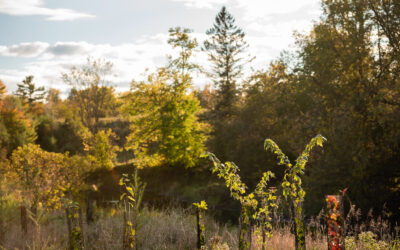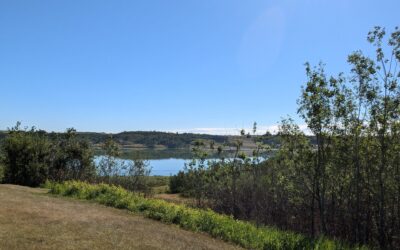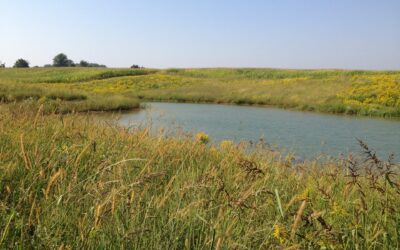ALUS Canada co-organized the country’s first-ever Natural Infrastructure Forum in November 2018.
Experts from across the nation assembled in Winnipeg on November 14 for Canada’s first-ever Natural Infrastructure Forum, intended to determine how to build cities, towns and landscapes that are more resilient to climate change.
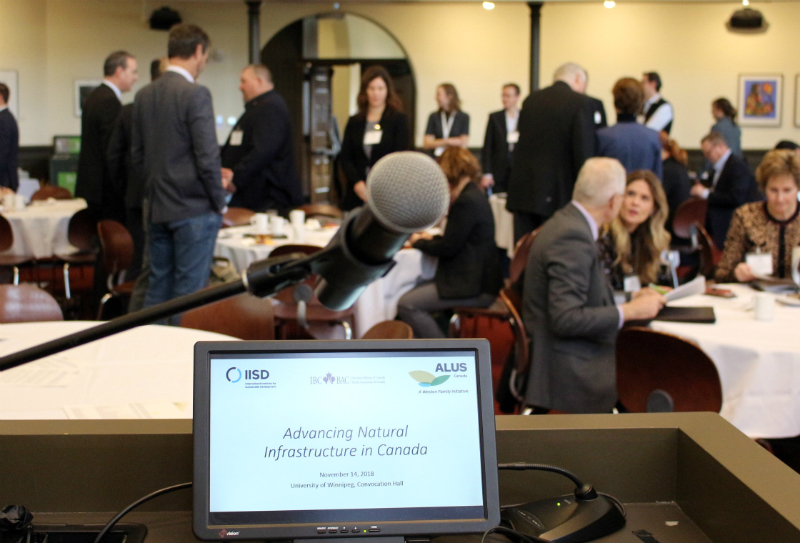
Advancing Natural Infrastructure in Canada: ALUS Canada, Insurance Bureau of Canada and the International Institute for Sustainable Development organized the country’s first-ever Natural Infrastructure Forum in November 2018. (Photo: Matthew TenBruggencate, IISD)
The Forum was organized by ALUS Canada, A Weston Family Initiative, the Insurance Bureau of Canada (IBC), the International Institute for Sustainable Development (IISD), Manitoba Habitat Heritage Corporation, and the Intact Centre for Climate Adaptation, with support from the Government of Manitoba.
“Here in Manitoba, we are no strangers to natural disasters—especially flooding,” said Manitoba’s Minister for Sustainable Development Rochelle Squires, who opened the event. “We need to look at natural solutions that we already possess in our beautiful province… Natural Infrastructure is good for taxpayers and the environment.”
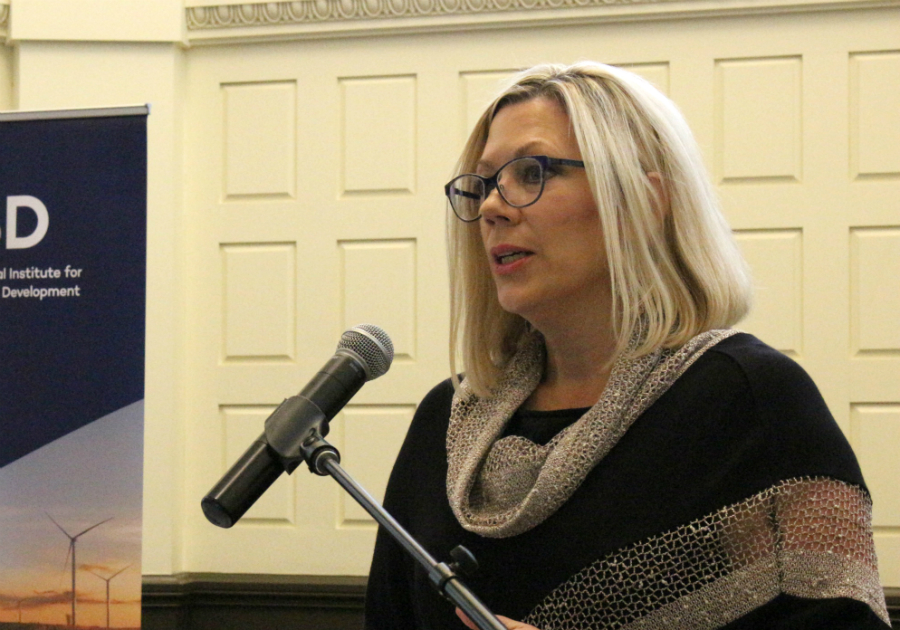
“Here in Manitoba, we are no strangers to natural disasters—especially flooding. We need to look at natural solutions that we already possess in our beautiful province,” said Manitoba’s Minister for Sustainable Development, Rochelle Squires, who opened the Winnipeg event November 14. (Photo: Matthew TenBruggencate, IISD)
The Natural Infrastructure Forum featured presentations by 14 expert speakers from across the country, exploring why natural infrastructure is an important and efficient use of financial resources, and how we can accelerate these projects in Canada.
“It is important to get the right people in the room, so we can work together to move Canada’s natural infrastructure agenda forward,” said Lara Ellis, Vice-President, Policy and Partnerships at ALUS Canada, who was one of the Forum organizers and presented on Canadian and international models for natural infrastructure implementation projects on private land.
The ALUS delegation also included ALUS Canada CEO Bryan Gilvesy, and Ontario MPP Toby Barrett, who spoke about his private member’s bill on ALUS to improve community resiliency, which recently received unanimous support upon its second reading in the provincial legislature.
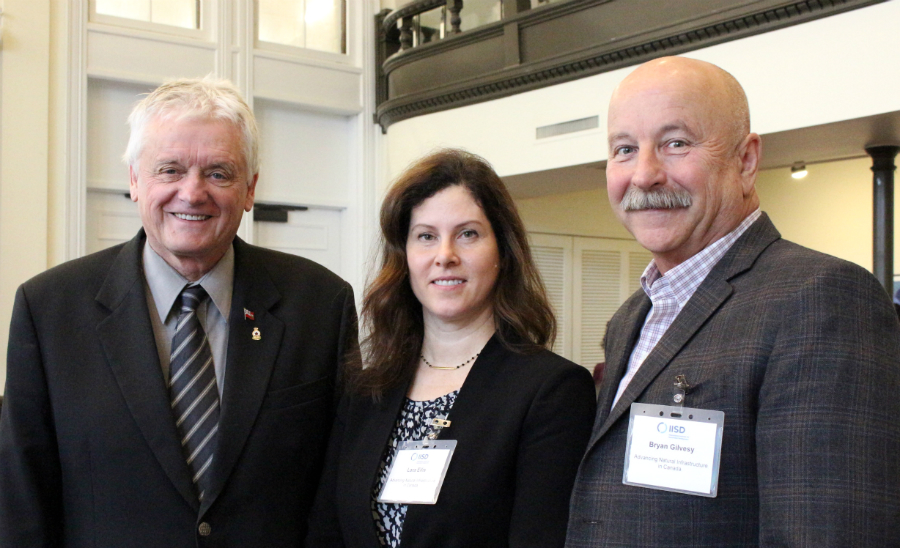
The ALUS delegation at the Natural Infrastructure Forum, from L to R: Ontario MPP Toby Barrett, whose private member’s bill on ALUS (Bill 28) recently received unanimous support in the provincial legislature upon its second reading; Lara Ellis, Vice-President, Policy and Partnerships at ALUS Canada; and Bryan Gilvesy, CEO of ALUS Canada. (Photo: Matthew TenBruggencate, IISD)
Across Canada, natural infrastructure is an important complement to traditional, man-made infrastructure, such as wastewater treatment plants, pipelines and reservoirs. And in the face of rising climate uncertainty, Canada could be using more natural infrastructure, such as wetlands, riparian zones and urban forests, to build more resilient cities, towns and landscapes.
“Investing in natural infrastructure like wetlands can be cheaper and more effective than traditional built infrastructure” said David McLaughlin, Director of Climate Change for Canada at IISD. “It is fast becoming a smarter option for cities and communities looking to adapt to climate change and protect residents from flooding.”
In fact, Canada could save millions of dollars and mitigate the impacts of flooding and other natural disasters by investing in natural infrastructure, according to a recent report from IBC, IISD and the Intact Centre on Climate Adaptation.
The Forum paid special attention to the critical issue of financing Canada’s necessary natural infrastructure work. Craig Stewart, Vice-President, Federal Affairs, at the Insurance Bureau of Canada, led a panel discussion with representatives of Manitoba Infrastructure, Infrastructure Canada and Environment and Climate Change Canada on how best to leverage existing federal and provincial Natural Infrastructure programs.
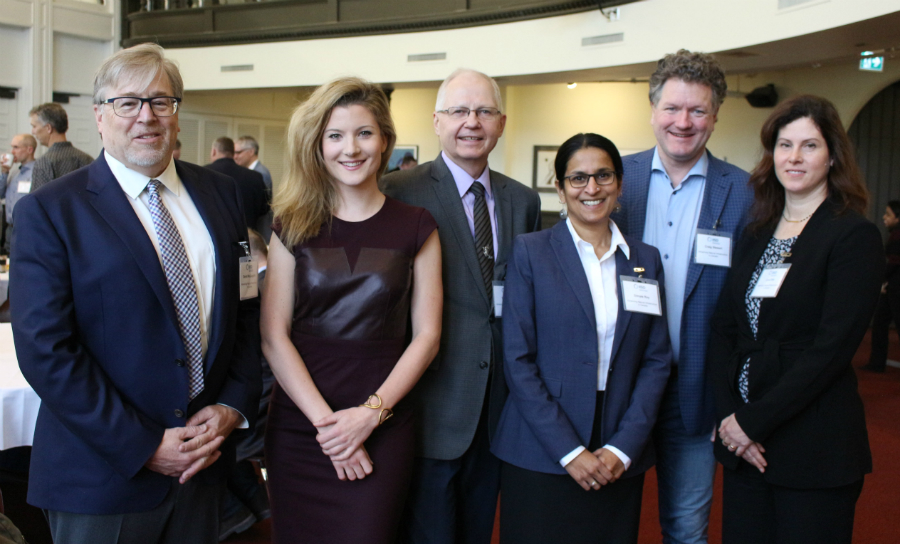
The organizing committee for Canada’s first-ever Natural Infrastructure Forum, from L to R: David McLaughlin (IISD’s Director of Climate Change for Canada), Natalia Moudrak (Intact Centre for Climate Adaptation’s Infrastructure Adaptation Program Director), Tim Sopuck (CEO of Manitoba Habitat Heritage Corporation), Dimple Roy (IISD’s Water Program Director), Craig Stewart (IBC’s Vice-President, Federal Affairs), Lara Ellis (ALUS Canada’s VP, Policy and Partnerships). (Photo: Matthew TenBruggencate, IISD)
In addition, Thomas Börtzler (Munich Re Canada), presented international strategies, programs, and financing options for natural infrastructure projects, while Natalia Moudrak (Intact Centre for Climate Adaptation) outlined the costs and benefits of natural infrastructure assets, such as wetlands and ponds, which help reduce the risk of natural disasters in Canada.
The Forum’s roster of natural infrastructure experts also included [in alphabetical order]: Stephanie Cairns (Municipal Natural Assets Initiative, Smart Prosperity Institute); Mark Hadden (Scotiabank); Rob Olson (Manitoba Sustainable Development); Tim Sopuck (Manitoba Conservation Trust, Manitoba Habitat Heritage Corporation); Kevin Teneycke (The Nature Conservancy of Canada); Marian Weber (Innotech Alberta); and more.
For more information, please contact:
Lara Ellis (Vice-President, Policy and Partnerships, ALUS Canada): lellis [@] alus.ca
Sumeep Bath (Communications Manager, IISD Experimental Lakes Area): sbath [@] iisd.ca
ABOUT US
ALUS Canada, A Weston Family Initiative, is a national charitable organization that works with farmers and ranchers to establish and maintain green infrastructure projects that produce ecosystem services for Canadian communities. There are currently more than 18,500 acres enrolled in the ALUS program by 575 participants, from 21 communities in five provinces, and the program is rapidly expanding. ALUS.ca
The international team of multi-disciplinary experts at the International Institute for Sustainable Development (IISD), headquartered in Winnipeg, delivers the knowledge to act. We tackle some of the world’s most pressing problems by conducting innovative research, generating evidence and championing sustainable solutions. IISD.org
Established in 1964, the Insurance Bureau of Canada (IBC) is the national industry association representing Canada’s private home, auto and business insurers. Its member companies represent 90% of the Canadian property and casualty insurance market. IBC works on a number of fronts to increase public understanding of home, auto and business insurance. www.ibc.ca

